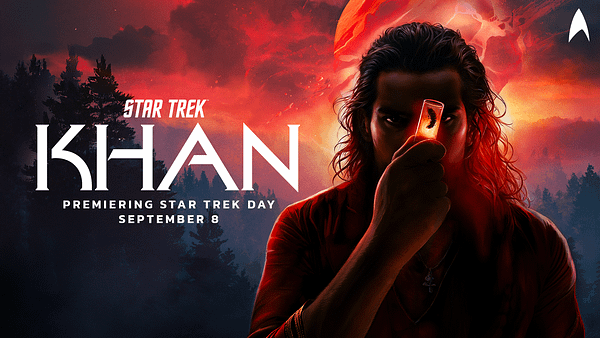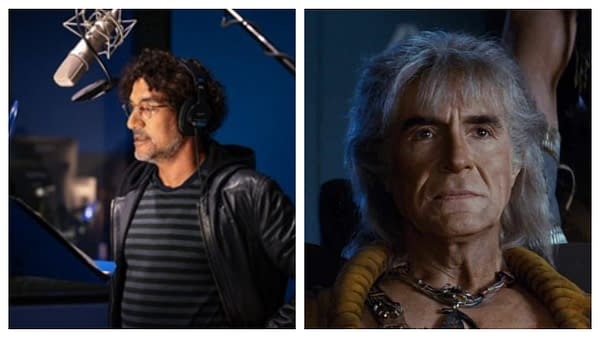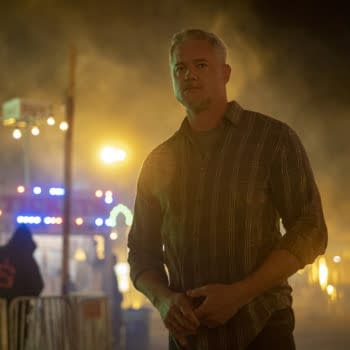Posted in: Audio Dramas, Review, Star Trek, TV | Tagged: star trek, Star Trek: Khan
Star Trek: Khan Review: Andrews and Schmidt Shine in Audio Drama
Star Trek: Khan tells another side of the franchise's most infamous, yet misunderstood villain in an epic Act II from director Nicholas Meyer.
A common trend among contemporary fiction is to expand perspectives and narratives among various characters, often revisiting the most standout figures. This hasn't been more abundant in the content-starved age of streaming as we're revisiting and expanding franchises, which include some of fiction's greatest villains. In the case of Star Trek's Khan Noonien Singh, the character originally played by Ricardo Montalban in The Original Series season one episode "Space Seed" and the 1982 film, The Wrath of Khan, there was an act two we never got to witness in his story in Star Trek: Khan from TWOK director Nicholas Meyer along with co-writers Kirsten Beyer and David Mack, and director Fred Greenhalgh sought to fill in that gap that saw the former 20th century dictator, played by Naveen Andrews (Lost), attempt to lead his people and rebuilt his new civilization on Ceti Alpha V with his fellow Augments, and a new partner, the recent expatriate Lt. Marla McGivers (Wrenn Schmidt), who chose to join him in lieu of a Starfleet court martial at the end of "Space Seed."

Star Trek: Khan: A Brave New World of Survival
To set the scene, "Space Seed" sees the U.S.S. Enterprise find the SS Botany Bay, which was originally thought of as an abandoned ship until the away team discovers there's a crew in stasis and induced sleep. The first pod discovered was Khan's, and as he starts to come to, he's flatlining, and the crew rushes to his rescue. As he reveals little about himself, the crew digs a little deeper into his past as Kirk (William Shatner) questions their new guest about his life and origins, while resident historian McGivers (Madlyn Rhue) becomes fascinated by him. As suspicion rises, Khan enthralls McGivers and convinces him to join his mutiny, along with helping him free his fellow Augments. Upon taking over the Enterprise, McGivers feels guilty over being complicit as the crew gets tortured, and eventually helps Kirk retake the ship. Kirk and company find a tropical planet in the Ceti Alpha system, with Spock (Leonard Nimoy) wondering what progress they would make in a few years.
Without going into the details of The Wrath of Khan, the story begins by revisiting a separate Star Trek timeline during Voyager season three episode "Flashback" that revealed that Tuvok (Tim Russ) served as an ensign onboard the USS Excelsior under Captain Hikaru Sulu (George Takei), with both actors reprising their roles for Star Trek: Khan. Trying to investigate the events of Project Genesis, the fallout of the Battle of the Mutara Nebula, and diving into Khan's past is Dr. Rosalind Lear (Sonya Cassidy), trying to find the missing pieces from Khan's story on Ceti Alpha V. From there, we pick up the story where we see the Augments settling on the planet's surface with a generous amount of resources. We also meet the various personalities of Khan's crew, voiced by Olli Haaskivi, Maury Sterling, Mercy Malick, and Zuri Washington. As far as any surprise returns, there were four of nine episodes available at the time, but no, there wasn't as far as the original The Wrath of Khan actors of Khan's crew who returned. As each episode plays out, it's nice to know we got the exposition we never did during the Gene Roddenberry-created series and the limited screen time Khan's crew did during the film, splitting time with the TOS stars.

Does Star Trek: Khan enhance both the stories that bookend it? Andrews and Schmidt certainly garner The King and I vibes as Schmidt's McGivers infuses the empathy that helped her become part of Starfleet into the tyrant, who was once so set in his ways. We hear Andrews' Khan lead rather than break his people as they face a variety of challenges from reconciling their leader's past failures to the uncertainty of the future on a planet they know nothing about. We also get into the dangers the crew face from the planet before the cataclysmic effect that would trigger Khan's revenge in the 1982 film.
While it was nice to hear Takei and Russ's voices, I would have liked it if they cleaned up Takei's voice to more accurately match how he sounded in 1991 or 1996 than he does in 2025. In this case, AI probably would have helped him sound not like the 88-year-old he is today. As far as performances go, both presences leave us to wonder what could have been had Paramount gone with the Excelsior series instead of Enterprise, but a nice Easter Egg, nonetheless.

As far as Andrews and Schmidt, Andrews does have a nice vocal Shakespearean presence similar to Montalban and brings an ethnic authenticity to the role that his predecessors in Montalban and Star Trek Into Darkness (2013) star Benedict Cumberbatch lacked, given Andrews' Asian ancestry. While we saw a more nuanced side of Khan, what was more impressive was the way Meyer, Beyers, and Mack expanded Schmidt's role as McGivers, since this is the first time her story was told beyond the NBC series. The character was given an off-screen death for the Meyer film as the impetus for Khan's revenge against Kirk, despite not having any involvement in the planetary disaster that would turn Ceti Alpha V into a barren wasteland. While McGivers was conceived in the TOS era, she exhibits the kind of fierce independence that redeems her initial subservient nature of atypical 1960s TV.
Star Trek: Khan is ambitious mainly because, outside of novels, the franchise was typically always on screen, especially given the caliber of talent recruited. Could this have worked as a limited series? I don't see why not, because the tale of love, survival, and danger is right up Star Trek's alley. It also shows the audience that not every narrative has to be about the Federation. There's so much ripe fruit for the picking when you have so many different races like the Ferengi, Cardassians, Bajorans, Klingons, and Romulans, you can generate any new Star Trek story from. Star Trek: Khan shouldn't just be an experiment. It should serve as a model for future non-Federation stories in the future. New episodes of Star Trek: Khan premiere Mondays on Spotify, Apple, or other podcasting platforms.


















